Related Research Articles

Papua New Guinea, officially the Independent State of Papua New Guinea, is a country in Oceania that comprises the eastern half of the island of New Guinea and its offshore islands in Melanesia. It shares its only land border with Indonesia to the west and it is directly adjacent to Australia to the south and the Solomon Islands to the east. Its capital, located along its southeastern coast, is Port Moresby. The country is the world's third largest island country, with an area of 462,840 km2 (178,700 sq mi).

The prehistory of Papua New Guinea can be traced to about 50,000–60,000 years ago, when people first migrated towards the Australian continent. The written history began when European navigators first sighted New Guinea in the early part of the 17th century.

Transport in Papua New Guinea is mainly based around roads and air travel. It is in many cases heavily limited by the mountainous terrain and copious amount of rainfall and frequent severe weather occurring in many locations, such as Lae. The capital, Port Moresby, is not linked by road to any of the other major towns and many highland villages can only be reached by light aircraft or on foot.
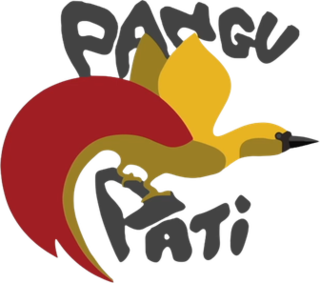
The Pangu Pati, officially Papua na Niugini Yunion Pati, is a nationalist and developmentalist political party on the centre-left in Papua New Guinea. The party is the oldest political party in Papua New Guinea and has held all levels of government throughout its history. As of 2023, it is the largest party in the National Parliament.
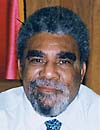
Sir Mekere Morauta was a Papua New Guinean politician and economist who served as the 7th Prime Minister of Papua New Guinea from 1999 to 2002. Inheriting a depressed economy and a fractious legislature, he embarked on fundamental reforms of the country's economy and political system.
Rugby league is a popular team sport in Papua New Guinea, and is the national sport. Papua New Guinea has a reputation for being the most passionate supporter of the game in the world.
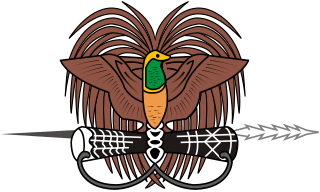
The National Executive Council (NEC), also known as the Cabinet of Papua New Guinea functions as the policy and decision-making body of the executive branch within the government system of Papua New Guinea. The Prime Minister and Ministers serve as members of the Cabinet.

James Marape is a Papua New Guinean politician who has served as the prime minister of Papua New Guinea since May 2019. He has been a member of the National Parliament of Papua New Guinea since July 2007, representing the electorate of Tari-Pori Open in Hela Province in the New Guinea Highlands. He has held Cabinet Posts as Minister of Education (2008–2011), Minister of Finance (2012–2019), and Minister of Foreign Affairs (2023–present). Marape entered the 2022 elections under the banner of the Pangu Party and won more seats than any other party. He was therefore entitled to form the government. His new government was elected unopposed by the new parliament.
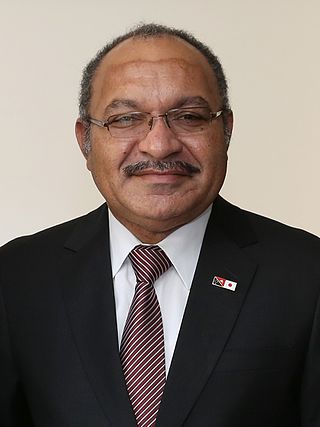
Peter Charles Paire O'Neill is a Papua New Guinean politician who served as the seventh Prime Minister of Papua New Guinea from 2011 to 2019. He has been a Member of Parliament for Ialibu-Pangia since 2002. He was a former cabinet minister and the leader of the People's National Congress between 2006 and 2022. He resigned his position as prime minister to avoid a vote of no confidence, and he was succeeded by James Marape. O'Neill won re-election to the National Parliament of Papua New Guinea in 2022 in the first round with a large majority, which is unusual in the country.
Belden Namah is a Papua New Guinean politician. Namah is a member of the National Parliament for the Papua New Guinea Party, and has represented Vanimo-Green River District since 2007. He served in the Cabinet from 2007 to 2010, and as Deputy Prime Minister from 2011 to 2012. In 2012, Namah became a member of the opposition. After retaining his seat in the 2022 election, he said that he would not rejoin the opposition.
Eriku is a suburb of Lae in the Morobe Province, Papua New Guinea.
Patrick Pruaitch, CMG is a Papua New Guinea politician who represented the Aitape-Lumi constituency in the West Sepik Province of Papua New Guinea in the National Parliament of Papua New Guinea from 2002 to 2022. He was a Cabinet Minister with few interruptions from 2002–2010 and from 2012–2017. From November 2019–November 2020, he was Minister for Foreign Affairs. From 2017–2019 and 2020-2022 he was Leader of the Opposition. He was twice – in 2019 and 2020 – alternate PM in unsuccessful attempts to unseat the government.

Bryan Jared Kramer is a Papua New Guinea politician and Member of the 10th and 11th Parliament of Papua New Guinea. Formerly a member of the Pangu Party, he founded the Allegiance Party, of which he was the sole MP, in 2018. He ran nine candidates in the 2022 National Elections, including one in each of Madang's seven electorates. Kramer was returned with a sizeable majority, but was unsuccessful in securing the election of another Party member. He was suspended from office on 30 September 2022 pending the outcomes of a leadership tribunal. On Tuesday 28 February 2023 the three-man bench unanimously found Kramer guilty of seven counts against him. A three-man bench recommended dismissal for two counts of "scandalising the judiciary" and fines totalling K10,000 (USD3,000) for five counts related to use of district funds. Kramer was dismissed from office by the Governor General on 24 May 2023. He will not be able to re-contest an election for five years, allowing him to compete in the 2032 election. A by-election for Madang Open will be held in 2024.
The COVID-19 pandemic in Papua New Guinea is part of the worldwide pandemic of coronavirus disease 2019 caused by severe acute respiratory syndrome coronavirus 2. The virus was confirmed to have reached Papua New Guinea on 20 March 2020. On 4 May 2020, Papua New Guinea was declared COVID-19 free. However, on 20 June, the government confirmed another case of COVID-19, meaning that the disease was present again within the country.
Events in the year 2021 in Papua New Guinea.
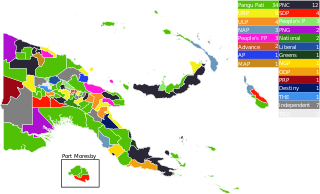
General elections were held in Papua New Guinea from 4 to 22 July 2022 to elect the members of the National Parliament for a new five-year term.
Events in the year 2022 in Papua New Guinea.

Justin Wayne Tkatchenko,, BEM is an Australian-born Papua New Guinean politician. He served as the Minister of Foreign Affairs in Papua New Guinea from 23 June 2022 to 12 May 2023.
Events in the year 2024 in Papua New Guinea.
References
- 1 2 3 4 5 "Death toll in PNG riots jumps to 22 after gruesome discovery of bodies in burnt out shops". ABC Australia. 12 January 2024. Archived from the original on 12 January 2024. Retrieved 12 January 2024.
- 1 2 3 "Troops restore order after riots in Papua New Guinea". RTL. 12 January 2024. Archived from the original on 12 January 2024. Retrieved 12 January 2024.
- ↑ Kuku, Rebecca (10 January 2024). "Moresby burns". The National. Archived from the original on 13 January 2024. Retrieved 11 January 2024.
- 1 2 3 4 5 "Papua New Guinea declares state of emergency after 15 killed in riots". Al Jazeera. 11 January 2024. Archived from the original on 11 January 2024. Retrieved 11 January 2024.
- 1 2 "Papua New Guinea: At least 15 dead after major rioting and looting". BBC News. 11 January 2024. Archived from the original on 11 January 2024. Retrieved 11 January 2024.
- ↑ "Papua New Guinea's security personnel storm parliament". RNZ. 10 January 2024. Archived from the original on 12 January 2024. Retrieved 12 January 2024.
- 1 2 "Papua New Guinea rocked by violence as pay error prompts police walkout, riots and looting". CNN. 11 January 2024. Archived from the original on 11 January 2024. Retrieved 11 January 2024.
- 1 2 "Papua New Guinea capital rocked by violent riots as police strike over pay". The Guardian. 11 January 2024. Archived from the original on 11 January 2024. Retrieved 11 January 2024.
- ↑ "Calm expected after Port Moresby riots but difficult to get looters off street without force". RNZ. 11 January 2024. Archived from the original on 12 January 2024. Retrieved 12 January 2024.
- ↑ "What is happening in PNG? The violent rioting over a pay 'glitch' explained". ABC Australia. 11 January 2024. Archived from the original on 13 January 2024. Retrieved 13 January 2024.
- ↑ "ENB imposes five-day curfew amid disturbances". The National. 12 January 2024. Archived from the original on 11 February 2024. Retrieved 13 January 2024.
- 1 2 3 4 "PNG's PM declares state of emergency as he suspends Police Commissioner". RNZ. 12 January 2024. Archived from the original on 11 January 2024. Retrieved 12 January 2024.
- 1 2 3 4 5 "Papua New Guinea Vows Crackdown After Riots Kill 15". VOA. 11 January 2024. Archived from the original on 15 January 2024. Retrieved 11 January 2024.
- ↑ "Shopping centre torched and shops looted in Papua New Guinea after 'glitch' short-changes public servants' pay packets". ABC Australia. 11 January 2024. Archived from the original on 12 January 2024. Retrieved 13 January 2024.
- ↑ "'Clear the streets and go home' PNG's Commissioner of Police". RNZ. 11 January 2024. Archived from the original on 14 January 2024. Retrieved 14 January 2024.
- 1 2 "'Everything's gone': Papua New Guinea picks up the pieces in wake of widespread looting". The Guardian. 16 January 2024. Archived from the original on 18 January 2024. Retrieved 22 January 2024.
- ↑ "Police commissioner David Manning reinstated after PNG riots". RNZ. 26 January 2024. Archived from the original on 26 January 2024. Retrieved 26 January 2024.
- ↑ "More suspensions as Papua New Guinea govt reacts to riots". RNZ. 17 January 2024. Retrieved 17 January 2024.
- ↑ "Riots in Papua New Guinea's 2 biggest cities reportedly leave 15 dead". Associated Press. 11 January 2024. Archived from the original on 14 January 2024. Retrieved 14 January 2024.
- ↑ "Violent riots in PNG leave 16 people dead, as PM declares state of emergency for 14 days". ABC Australia. 11 January 2024. Archived from the original on 11 January 2024. Retrieved 11 January 2024.
- ↑ "PNG Prime Minister Marape confident his coalition will stay intact". RNZ. 23 January 2024. Archived from the original on 22 January 2024. Retrieved 23 January 2024.
- 1 2 "Calls for confidence vote in PM Marape after deadly riots in Papua New Guinea". RNZ. 15 January 2024. Archived from the original on 15 January 2024. Retrieved 15 January 2024.
- ↑ "Marape plans to 'mobilise the youths' post-PNG riots". RNZ. 18 January 2024. Archived from the original on 18 January 2024. Retrieved 18 January 2024.
- ↑ "PNG Treasurer demoted in latest riot reaction". RNZ. 19 January 2024. Archived from the original on 19 January 2024. Retrieved 19 January 2024.
- ↑ "Papua New Guinea's PM James Marape says there was 'deep political influence' behind the deadly riots. Will he survive this crisis?". ABC Australia. 12 January 2024. Archived from the original on 12 January 2024. Retrieved 12 January 2024.
- ↑ "Shopping centre torched and shops looted in Papua New Guinea after 'glitch' short-changes public servants' pay packets". ABC Australia. 11 January 2024. Archived from the original on 11 January 2024. Retrieved 11 January 2024.
- ↑ "Port Moresby residents lose everything in riots blamed on dire economic situation and youth with poor prospects". ABC Australia. 15 January 2024. Archived from the original on 15 January 2024. Retrieved 15 January 2024.
- ↑ "James Marape 'can't pass the buck' for PNG riots, East Sepik governor says". RNZ. 22 January 2024. Archived from the original on 21 January 2024. Retrieved 22 January 2024.